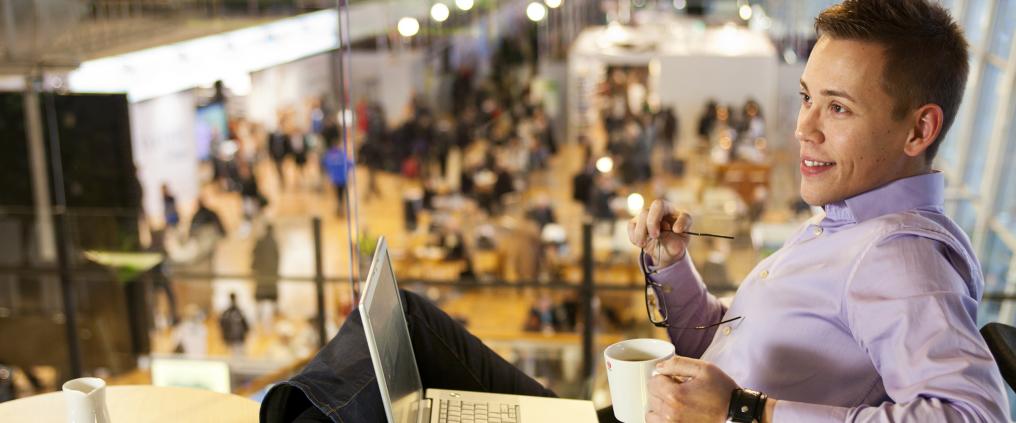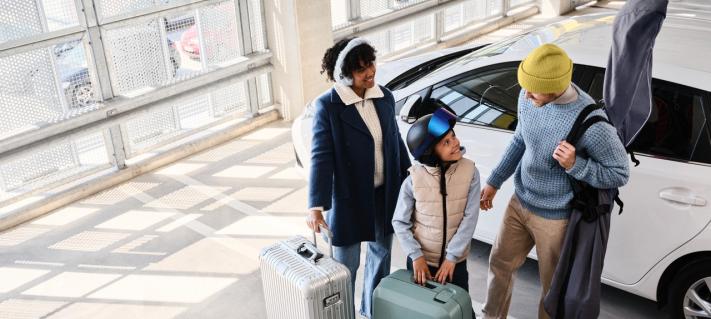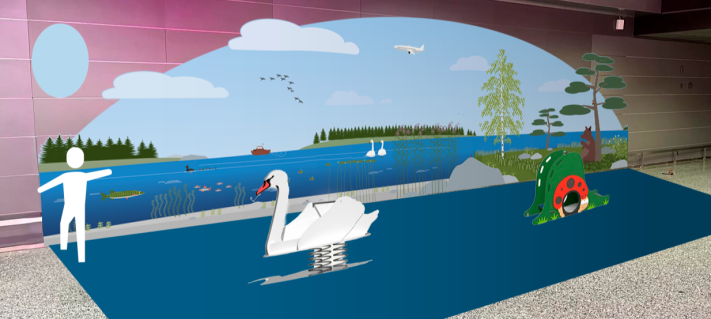1. How can you use the waiting time at airports sensibly?
For example, by walking or doing light exercises. Neck and shoulder exercises are important especially if you work for extended periods with bad posture, for example, with laptop on your lap.
Waiting time at airport supports well-being, if during that time you can relax and rest. For example, relaxation and meditation exercises, listening to music, reading, crossword puzzles and Sudoku may provide relaxation.
Helsinki Airport has numerous spaces and places where you can rest and relax: Suvanto points, Go Sleep sleeping pods, Kainuu lounge and airline lounges.
2. Should you work on the plane or at the airport?
The majority of people travelling as part of their job work during the trip. In this case, it is good to take breaks from work to recover.
For example, working on board a plane does not necessarily cause extra stress if it decreases your work load and the time spent on it feels meaningful. However, excessive work is not good for you.
3. What health risks are related with air travel?
The air pressure in the cabin of the plane, dry air, cramped premises and travel duration create all kinds of discomfort.
Staying put in a cramped space for an extended period of time increases the risk of phlebothrombosis and pulmonary thrombosis. Drying of the body caused by insufficient fluid intake also increases the risk. During long haul – lasting over six hours – flights, it is recommended to use compression socks, do calf exercises and drink at least one decilitre of water per hour.
4. How could I sleep better at a hotel?
If you have problems falling asleep at a hotel, you should find a way suited to you to relax and get your mind off work before going to bed.
Reasonably strenuous physical exercise is good sleeping medicine and also makes sleep deeper. However, you should have completed your physical exercise at least 3–4 hours before going to bed. Cultural and social activities have also been found to promote good sleep.
Temporary sleep deprivation is not detrimental to health, especially if it occurs fairly infrequently. However, it may lower performance and operating ability. Those people who travel frequently and often sleep too little are at risk of accumulating sleep deprivation.
5. What would help me to eat healthily on work-related trips?
Healthy eating on work-related travel abroad may be more challenging than usual. Some countries pose an increased risk of contracting diseases transmitted through food or water, which narrows your choice of dishes.
If working days drag on and schedules and tight, you may even skip meals. However, eating regularly every 3–5 hours is recommended both for health and alertness. It also keeps blood sugar levels even and is good for the metabolism.
Also keeping food portions reasonable promotes maintaining the level of alertness – large portions make you drowsy.
You should set aside time for meal breaks when planning the trip. You should also pay attention to the healthiness of the food you eat. You can have fruit as a snack just as long as you wash and peel them carefully yourself.
If you did not have time to eat properly during the day, dinner with its many courses easily leads to over-eating.
6. How can I slip more physical exercise in my work-related travel?
You should seek out physical activities that are suitable and pleasurable for you during your trips. With regard to health, it is possible to get enough endurance training merely by increasing functional exercising.
Walking up the stairs is particularly effective. For example, walking up the stairs to the fifth floor is enough to get a sufficient amount of endurance training.
Many hotels have gyms or a swimming pool and you should take advantage of them. You can often also jog in the vicinity of the hotel.
The employer may support the physical exercise activities of their employees, so that exercising opportunities are taken into account when selecting the hotel. Occupational health care may help to draw up suitable exercise programmes, such as a training programme for the hotel room.
7. What should a traveller take into account when seeking medical help?
Comprehensive travel insurance is a must for work-related travel. If you fall ill during work-related travel, the insurance company will provide you with information about the level of local hospitals. It is often possible to get a statement from a Finnish expert about the situation, which decreases any anxiety caused by the illness.
Hotels may have contract physicians, who may be utilised in emergencies. They usually have the right to refer the patients to correct care or examination location.
Occupational health agreements of some companies have an opportunity of being in contactwith your assigned occupational healthcare physician.
The level of hospital care varies greatly, especially in developing countries. It may be worthwhile avoiding non-urgent care and examinations during travel.
8. What is the best way to recover from a strenuous work trip?
Sufficient recovery from the burden of travel is necessary. If recovery is repeatedly insufficient, it may decrease the employee's well-being, health and coping at work.
If travelling has been strenuous or you have not gotten enough rest, you should postpone the start of the next working day after travel.
The best way to support recovery is to compensate travel time partly with free time. For example, an employee could work a shorter day after a travel day. Remote work day after travel also supports recovery, since commuting is avoided and it will be possible to sequence work according to how the employee feels.
Source: News item by the Finnish Institute of Occupational Health 27 October 2015.
Will you be at the airport on 10 November 2015?
If you are at Helsinki Airport on 10 November, come and get more tips from the Finnish Institute of Occupational Health experts. The themes during the day will be work-related travel, recovery and shift work.



